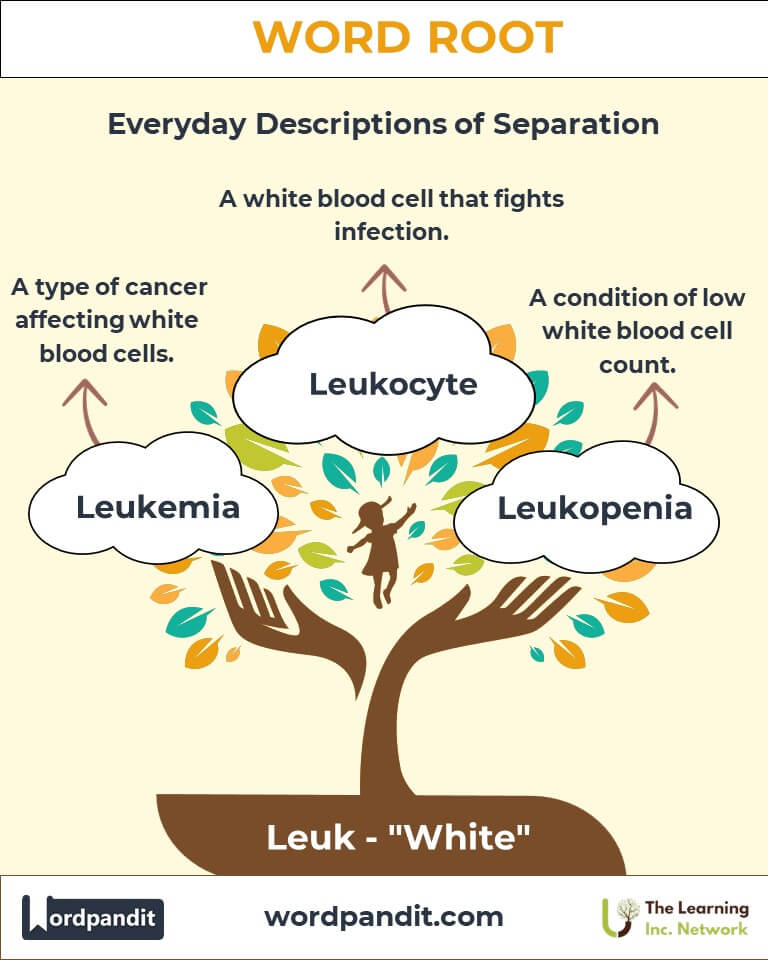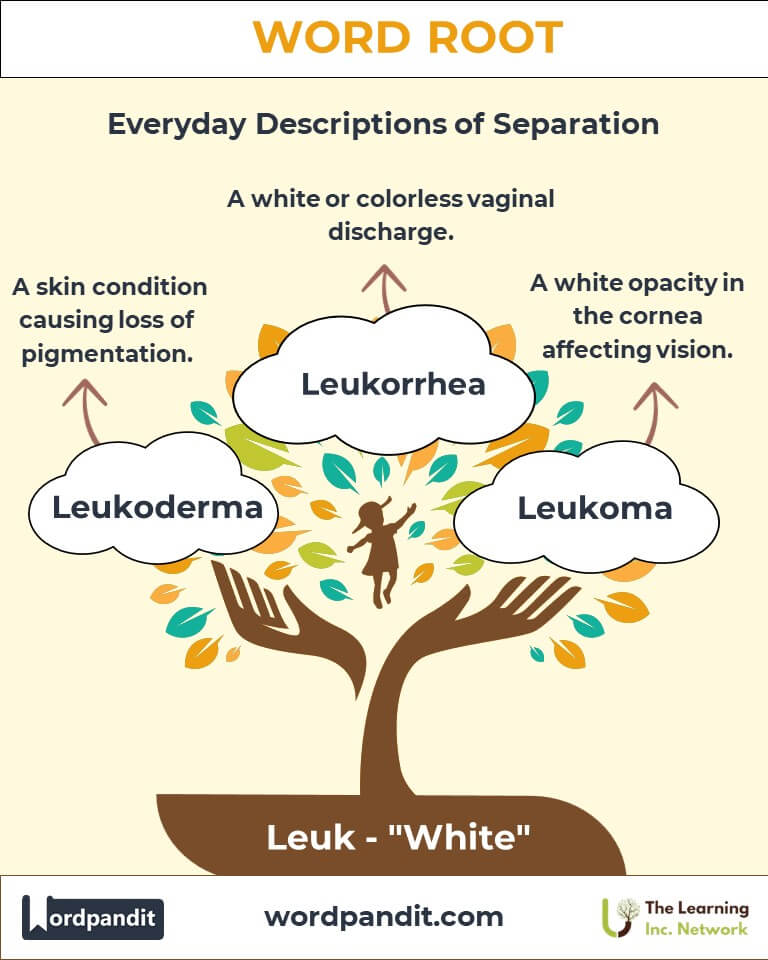Leuk: The Bright Root of Purity and Vitality in Language and Medicine
Discover the significance of the word root "leuk," derived from Greek, meaning "white." From its vital role in medical terminology like "leukemia" to its broader symbolic connotations of clarity and light, this root continues to shine across languages and disciplines.

Table of Contents
- Introduction: The Essence of "Leuk"
- Etymology and Historical Journey
- Mnemonic: Unlocking the Power of "Leuk"
- Common Leuk-Related Terms
- "Leuk" Through Time
- "Leuk" in Specialized Fields
- Illustrative Story: "Leuk" in Action
- Cultural Significance of the "Leuk" Root
- The "Leuk" Family Tree
- FAQs About the Leuk Word Root
- Test Your Knowledge: Leuk Word Root Quiz
- Conclusion: The Enduring Legacy of "Leuk"
Introduction: The Essence of "Leuk"
What do white blood cells and bright light have in common? The root "leuk" ties them together with its meaning of "white," derived from the Greek word "leukos." Pronounced "loo-k," this root is central to medical, linguistic, and cultural expressions of purity and clarity. Words like "leukemia" and "leukocyte" showcase its critical role in healthcare, while its symbolic associations evoke brightness and vitality.

Etymology and Historical Journey
The word root "leuk" traces back to the ancient Greek word leukos (white, bright). Historically, the concept of whiteness carried associations with purity, cleanliness, and light. Over centuries, "leuk" has evolved into terms describing white or colorless entities, particularly in medical science, where it denotes elements like white blood cells (leukocytes) essential for immunity.
Mnemonic: Unlocking the Power of "Leuk"
Visualize a dazzling, snow-covered mountaintop reflecting sunlight—a perfect representation of "leuk's" association with whiteness and brilliance.
Mnemonic Device: "Leuk is like the peak of white light, symbolizing clarity and purity."
Common Leuk-Related Terms
- Leukemia (loo-KEE-mee-uh): A type of cancer affecting white blood cells.
- Example: "Doctors diagnosed her with leukemia, a condition requiring immediate treatment."
- Leukocyte (LOO-kuh-site): A white blood cell that fights infection.
- Example: "A high leukocyte count often indicates an immune response."
- Leukoderma (loo-koh-DUR-muh): A condition causing loss of skin pigmentation.
- Example: "The patient's leukoderma was treated with specialized creams."
- Leukorrhea (loo-kuh-REE-uh): A white or colorless vaginal discharge.
- Example: "Leukorrhea is a common symptom during pregnancy."
- Leukopenia (loo-kuh-PEE-nee-uh): A reduction in the number of white blood cells.
- Example: "Chemotherapy can lead to leukopenia, weakening the immune system."
"Leuk" Through Time
- Leukoma (Ancient): Originally referred to a white opacity in the cornea.
- Evolution: Its usage has narrowed to specific medical conditions today.
- Leukemia (Modern): Coined in the 19th century, this term has become pivotal in oncology, symbolizing advancements in hematological research.
"Leuk" in Specialized Fields
- Hematology:
- Leukocyte: White blood cells critical for fighting infection.
- Importance: Central to diagnosing and understanding immune-related disorders.
- Dermatology:
- Leukoderma: Describes depigmentation disorders.
- Relevance: Highlights the root's application in skin conditions.
- Oncology:
- Leukemia: A hallmark term for blood cancer.
- Application: Drives research into targeted therapies and treatment protocols.
Illustrative Story: "Leuk" in Action
In a bustling hospital, Dr. Elena discovered her patient’s persistent fatigue was due to leukemia. Using advanced imaging, she observed abnormal leukocytes multiplying uncontrollably. Meanwhile, across town, a dermatologist treated a patient with leukoderma, restoring their confidence. These cases demonstrated how "leuk" illuminates medical understanding and care.
Cultural Significance of the "Leuk" Root
The root "leuk" extends beyond medicine to symbolize light, purity, and renewal in many cultures. Ancient Greek and Roman art often depicted white as a divine or virtuous color. In literature, phrases like "white as snow" evoke clarity and perfection, connecting "leuk" to universal ideals of purity.

The "Leuk" Family Tree
- Alba- (Latin: white)
- Albino: A person with a lack of pigment.
- Albedo: The measure of reflectivity in physics.
- Cand- (Latin: shining white)
- Candid: Honest and clear.
- Candela: A unit of luminous intensity.
- Blanc- (French: white)
- Blanch: To whiten or remove color.
- Blank: Something empty or devoid of markings.

FAQs About the "Leuk" Word Root
Q: What does "leuk" mean, and where does it come from?
A: The root "leuk" means "white" or "bright," originating from the Greek word leukos. This term has been widely adopted in medical terminology to describe colorless or white elements, such as white blood cells (leukocytes) and conditions associated with them.
Q: What is the role of leukocytes in the body?
A: Leukocytes, also known as white blood cells, are a critical part of the immune system. They help fight infections, destroy pathogens, and repair tissues. When the body is under attack, the production of leukocytes increases to counteract the threat.
Q: What is leukemia, and why is it named after "leuk"?
A: Leukemia is a type of cancer that affects the bone marrow and leads to an overproduction of abnormal white blood cells. It is named after "leuk" because these cancerous cells originate from the same group of cells that produce normal leukocytes.
Q: How does leukopenia affect health?
A: Leukopenia refers to a lower-than-normal count of white blood cells. This condition weakens the immune system, making the body more susceptible to infections. It can result from illnesses, infections, or treatments like chemotherapy.
Q: What is leukoderma, and how is it treated?
A: Leukoderma is a condition characterized by loss of skin pigmentation, leading to white patches. Treatments may include topical steroids, light therapy, or surgical grafting of pigmented skin, depending on the severity.
Test Your Knowledge: "Leuk" Mastery Quiz
1. What does the root "leuk" mean?
2. What is a leukocyte?
3. What condition does "leukemia" describe?
4. What does "leukoderma" mean?
5. What is leukopenia?
Conclusion: The Enduring Legacy of "Leuk"
The root "leuk" embodies purity, vitality, and brilliance, enriching both language and medicine. Its applications in critical fields like oncology and hematology underscore its importance in understanding health and disease. As medical science advances, "leuk" will continue to illuminate paths to discovery, treatment, and healing.












